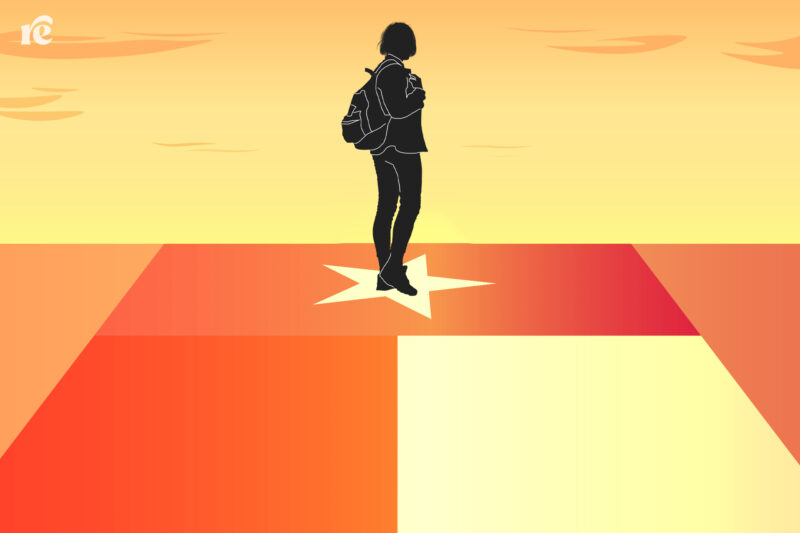Texas’ Anti-DEI Law Leaves Students Standing Alone
The combination of SB 17 and the reversal of Roe v. Wade restricts my liberties as a woman, a person of color, and a daughter of immigrants.

This story is part of our monthly series, Campus Dispatch. Read the rest of the stories in the series here.
Our government is supposed to protect life, liberty, and the pursuit of happiness. But sometimes, it does the opposite.
Texas is tacos, cowboys, and—most importantly—freedom. Yet, this state, in congruence with many of its neighbors, has been limiting its founding principle: Texas isn’t truly free.
And for college students, this can be suffocating.
Since my first semester at the University of Texas at Austin, I’ve been a graphic and layout designer for the Daily Texan, one of the nation’s premier college newspapers and a point of pride for the university. With more than 300 fellow students producing stories and content for over 50,000 of our peers, the newsroom’s diversity and inclusion board is an important desk. It’s tasked with checking all published work to ensure it’s factually correct and representative of the school’s massive population.
However, at the beginning of the year, the Texan was forced to rename our D&I desk and rework its abilities. Now when I enter the newsroom as a sophomore, I walk by the “advocacy and belonging” desk. This transformation was due to Senate Bill 17, which Gov. Greg Abbott signed in June and bans diversity, equity, and inclusion policies that affect mandatory training, hiring practices, and other programs at public Texas universities. It went into effect January 1.
The student newspaper isn’t the only campus group affected by SB 17. UT’s student government had to restructure its diversity and inclusion department as well, and its Queer and Trans Student Alliance Agency was dissolved. These changes may seem like “rebranding” tactics for the groups, but there are more targeted, profound impacts on minorities who need their help the most.
Take undocumented students, for example. Texas has the second-highest number of undocumented students in the United States, and the UT-funded Monarch scholarship and program assisted them with finding professional opportunities and academic help. But as a result of SB 17, Monarch was shut down on January 1—removing a crucial resource that helped marginalized students succeed.
It’s never been more clear that the combination of SB 17 and the reversal of Roe v. Wade restricts my liberties as a woman, a person of color, and a daughter of immigrants.
Laws meant to “safeguard” mental and physical issues students face are being removed. This includes dismantling or forcibly renaming institutions that were historically put in as places for students to confide in one another, such as the Gender & Sexuality Center renaming to the Women’s Community Center or the shutting down of UT’s Multicultural Engagement Center. SB 17 disturbs, if not discourages, their existence and disrupts the sanctity of students involved in these organizations; student members lose hope, resources, and communities.
College is where people make friends for a lifetime. But now, there’s a room open for hate. Recently, UT students have expressed feeling isolated and unsupported in an “even more obvious” manner since SB 17 went into effect, as the Texan reported.
College is also a place to build one’s career—especially in Texas, which has seen an influx of companies moving to its metropolises. If diversity and inclusion acknowledgment is removed from academic settings, what impact could it have on corporations in our state? Would they disregard DEI practices too? Issues faced on campus shouldn’t continue into the office, as they greatly impact one’s mental health, career trajectory, and productivity.
Reproductive risks are another legal issue—one that can keep students from choosing to study in Texas in the first place. After Roe was overturned in June 2022, prospective students have voiced their concerns about their bodily autonomy—and rightfully so. The possibility of not being able to receive adequate abortion care, restrictions on gender-affirming care, and the social impacts of Texas laws on minority groups drive away top students from our public universities.
As someone who grew up in California, I understand it can be hard to grapple with Texas’ often extreme political and social stance. But as a Texas student myself, a lack of out-of-state attendees at my university makes me wonder what my experience could have been. Having different upbringings and political views from around the country enriches socialization and expression at any academic institution, and Texas is no exception.
The list of freedoms Texas protects seems foggy in comparison to freedoms that Texans lose depending on their race, gender, and immigration status.
University campuses are meant to be a land of academic, professional, and personal freedom. But how does a college student explore when legislative barricades are placed within university walls? How does a college student get medical care for their reproductive needs? Or report discrimination to a D&I board? What is Texas even trying to achieve, and how are these laws achieving them?
And most importantly—how does reducing our liberties align with the foundation on which this state is built?
